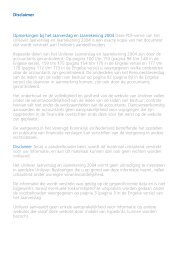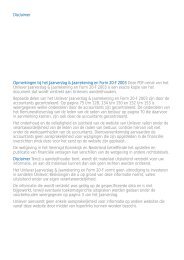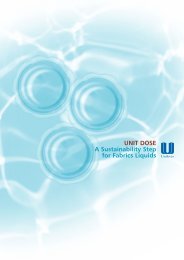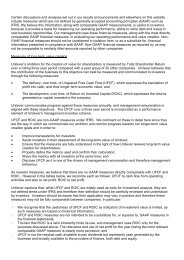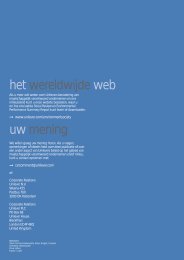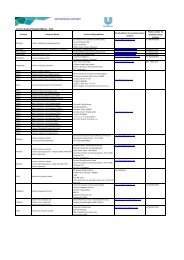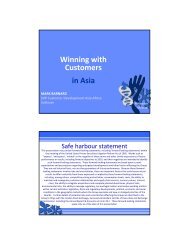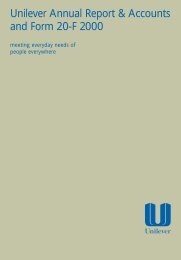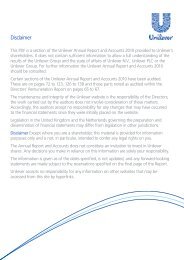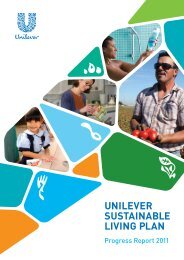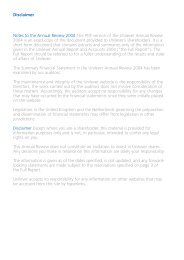Meeting everyday needs of people everywhere - Unilever
Meeting everyday needs of people everywhere - Unilever
Meeting everyday needs of people everywhere - Unilever
You also want an ePaper? Increase the reach of your titles
YUMPU automatically turns print PDFs into web optimized ePapers that Google loves.
60 <strong>Unilever</strong> Annual Report on Form 20-F 1999 Financial Statements<br />
Statements <strong>of</strong> directors’ responsibilities<br />
Annual accounts<br />
The directors are required by Book 2 <strong>of</strong> the Civil Code in<br />
the Netherlands and the United Kingdom Companies Act<br />
1985 to prepare accounts for each financial year which<br />
give a true and fair view <strong>of</strong> the state <strong>of</strong> affairs <strong>of</strong> the<br />
<strong>Unilever</strong> Group, NV and PLC as at the end <strong>of</strong> the financial<br />
year and <strong>of</strong> the pr<strong>of</strong>it or loss for that year.<br />
The directors consider that in preparing the accounts the<br />
Group, NV and PLC have used appropriate accounting<br />
policies, consistently applied and supported by reasonable<br />
and prudent judgements and estimates, and that all<br />
accounting standards which they consider to be applicable<br />
have been followed, except as noted under ‘Accounting<br />
standards’ on page 62.<br />
The directors have responsibility for ensuring that NV<br />
and PLC keep accounting records which disclose with<br />
reasonable accuracy their financial position and which<br />
enable the directors to ensure that the accounts comply<br />
with the relevant legislation. They also have a general<br />
responsibility for taking such steps as are reasonably<br />
open to them to safeguard the assets <strong>of</strong> the Group<br />
and to prevent and detect fraud and other irregularities.<br />
This statement, which should be read in conjunction with<br />
the ‘Report <strong>of</strong> independent auditors’ set out on page 61,<br />
is made with a view to distinguishing for shareholders the<br />
respective responsibilities <strong>of</strong> the directors and <strong>of</strong> the<br />
auditors in relation to the accounts.<br />
Going concer n<br />
The directors continue to adopt the going concern basis<br />
in preparing the accounts. This is because the directors,<br />
after making enquiries and following a review <strong>of</strong> the<br />
Group’s budget for 2000 and 2001, including cash flows<br />
and borrowing facilities, consider that the Group has<br />
adequate resources to continue in operation for the<br />
foreseeable future.<br />
Internal control<br />
<strong>Unilever</strong> has a well established control environment,<br />
which is well documented and regularly reviewed.<br />
This incorporates internal control procedures which<br />
are designed to provide reasonable, but not absolute,<br />
assurance that assets are safeguarded and the risks facing<br />
the business are being controlled. The Boards <strong>of</strong> NV and<br />
PLC have also established a clear organisation structure,<br />
including delegation <strong>of</strong> appropriate authorities. The<br />
Group’s control environment is supported through a<br />
Code <strong>of</strong> Business Principles, which sets standards <strong>of</strong><br />
pr<strong>of</strong>essionalism and integrity for its operations worldwide.<br />
The Boards have overall responsibility for establishing key<br />
procedures designed to achieve a system <strong>of</strong> internal<br />
control and for reviewing its effectiveness. The day to day<br />
responsibility for implementation <strong>of</strong> these procedures and<br />
ongoing monitoring <strong>of</strong> risk and the effectiveness <strong>of</strong> these<br />
controls rests with the Group’s senior management at<br />
individual operating company and Business Group level.<br />
Business Groups, each <strong>of</strong> which have their own Risk<br />
Committees, review, on an ongoing basis, the risks<br />
faced by their group and the related internal control<br />
arrangements and provide written reports to the<br />
Corporate Risk Committee. This is comprised mainly <strong>of</strong><br />
Board members and chaired by the Financial Director. The<br />
Corporate Risk Committee maintains oversight, on behalf<br />
<strong>of</strong> the Boards, <strong>of</strong> the controls in place to identify, evaluate<br />
and manage risk. It reports regularly to the Boards, which<br />
retain ultimate responsibility.<br />
<strong>Unilever</strong>’s corporate internal audit function plays a key role<br />
in providing an objective view and continuing assessment<br />
<strong>of</strong> the effectiveness <strong>of</strong> the internal control systems<br />
throughout <strong>Unilever</strong> to both operating management<br />
and the Boards. The Group has an independent Audit<br />
Committee, entirely comprised <strong>of</strong> Advisory Directors.<br />
This Committee meets regularly with corporate internal<br />
audit and the external auditors.<br />
<strong>Unilever</strong> has a comprehensive budgeting system with an<br />
annual budget approved by the Boards, which is regularly<br />
reviewed and updated. Performance is monitored against<br />
budget and the previous year through monthly and<br />
quarterly reporting routines. The Group reports to<br />
shareholders quarterly.<br />
<strong>Unilever</strong>’s system <strong>of</strong> internal control has been in place<br />
throughout 1999 and up to the date <strong>of</strong> this report, and<br />
complies with the recommendations <strong>of</strong> ‘Internal Control<br />
– Guidance for Directors on the Combined Code’,<br />
published by the Internal Control Working Party <strong>of</strong> the<br />
Institute <strong>of</strong> Chartered Accountants in England & Wales<br />
in September 1999.



